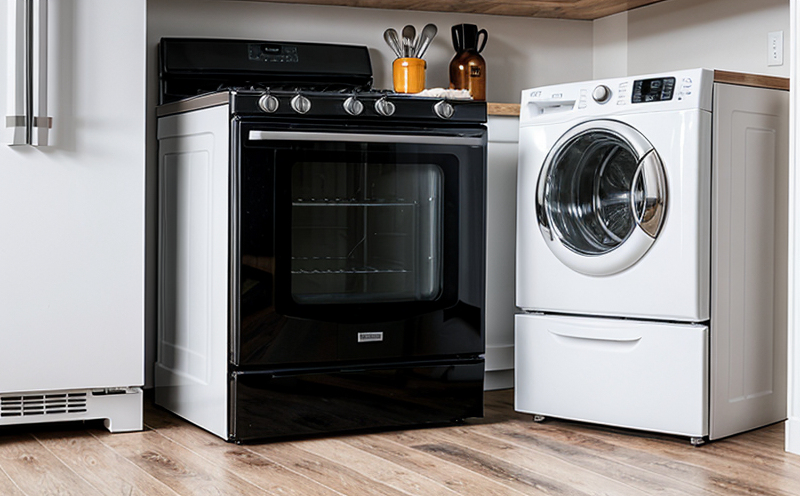Firmware Reliability Testing in Appliances
The firmware reliability testing of household appliances is a critical process that ensures products meet stringent quality and safety standards. Firmware, which is embedded software that controls various functions within an appliance, plays a pivotal role in the operation and performance of modern consumer electronics. This service focuses on verifying the robustness, stability, and longevity of this firmware under real-world conditions.
Our testing methodology involves rigorous simulation of user interactions and environmental factors such as temperature variations, power fluctuations, and prolonged usage scenarios. The goal is to identify potential vulnerabilities or issues that could lead to product failure, data corruption, or security breaches. This service is particularly important for appliances with complex functionalities like smart fridges, washing machines, and air conditioners.
The testing process begins with a thorough understanding of the appliance’s firmware architecture and its intended use cases. We then develop a comprehensive test plan that includes various stress tests such as endurance testing (long-term continuous operation), load testing (simulating high-demand usage conditions), and interoperability testing (ensuring compatibility across different systems).
One of the key challenges in firmware reliability testing is ensuring that the tests accurately reflect real-world scenarios. This involves understanding the expected lifespan of the appliance, typical user behaviors, and environmental factors that could impact performance over time. By simulating these conditions, we can uncover potential issues early on in the development process, allowing for necessary corrections before product release.
Another critical aspect is ensuring data integrity during firmware updates. As appliances become more connected and reliant on software updates, it’s essential to test how changes affect existing functionalities. We perform rollback testing to ensure that any update can be reversed without causing system instability or data loss.
The success of firmware reliability testing lies not only in identifying defects but also in providing actionable insights for improvement. Our reports offer detailed analysis of test results, highlighting areas where the firmware performs well and those requiring enhancement. This information is invaluable for R&D teams looking to innovate while maintaining product quality.
Compliance with international standards such as ISO/IEC 17025 ensures that our testing laboratory meets rigorous quality requirements. Our expertise in this area allows us to offer tailored solutions that align with the specific needs of each client, whether they are developing new products or ensuring existing ones meet regulatory requirements.
Applied Standards
The firmware reliability testing we provide adheres to several international standards designed to ensure product safety and performance. These include:
- ISO/IEC 17025 – General requirements for the competence of testing and calibration laboratories.
- ASTM E2946 – Practice for Conducting Reliability Growth Models in Software Development.
- ISO 26262 – Functional safety of road vehicles.
These standards provide a framework for conducting reliable and consistent testing, ensuring that our services meet the highest industry expectations. By adhering to these guidelines, we can offer clients peace of mind knowing their products are rigorously tested according to best practices.
Industry Applications
| Industry Sector | Application |
|---|---|
| Appliance Manufacturing | Ensure firmware stability and reliability in new product launches. |
| Smart Home Solutions | Verify interoperability between connected devices under various conditions. |
| Energy Management Systems | Evaluate firmware performance during peak energy usage scenarios. |
| Consumer Electronics | Identify potential issues in software updates that could affect device functionality. |
| Automotive Industry (for connected vehicles) | Test the resilience of embedded systems to withstand harsh environmental conditions. |
The diverse applications across these sectors underscore the importance of firmware reliability testing. By ensuring that each component functions seamlessly within its intended environment, we help manufacturers produce safer and more efficient products.
Why Choose This Test
Firmware reliability testing offers numerous benefits that make it an essential part of any product development lifecycle:
- Enhanced Product Quality: By identifying defects early, you can improve the overall quality and longevity of your products.
- Compliance with Regulations: Ensure compliance with relevant international standards and regulations to avoid potential legal issues.
- Improved User Experience: A reliable firmware enhances user satisfaction by minimizing downtime and ensuring consistent performance.
- Risk Mitigation: Early detection of vulnerabilities reduces the risk of product recalls and associated costs.
- Innovation Support: Reliable testing fosters innovation by allowing developers to focus on enhancing features rather than resolving bugs.
- Cost Efficiency: By catching issues early, you can save significant time and resources that would otherwise be spent on post-launch fixes.
Choosing our service means partnering with experts who understand the intricacies of firmware development and testing. Our comprehensive approach ensures that your products are not only reliable but also meet the highest standards expected by consumers worldwide.





